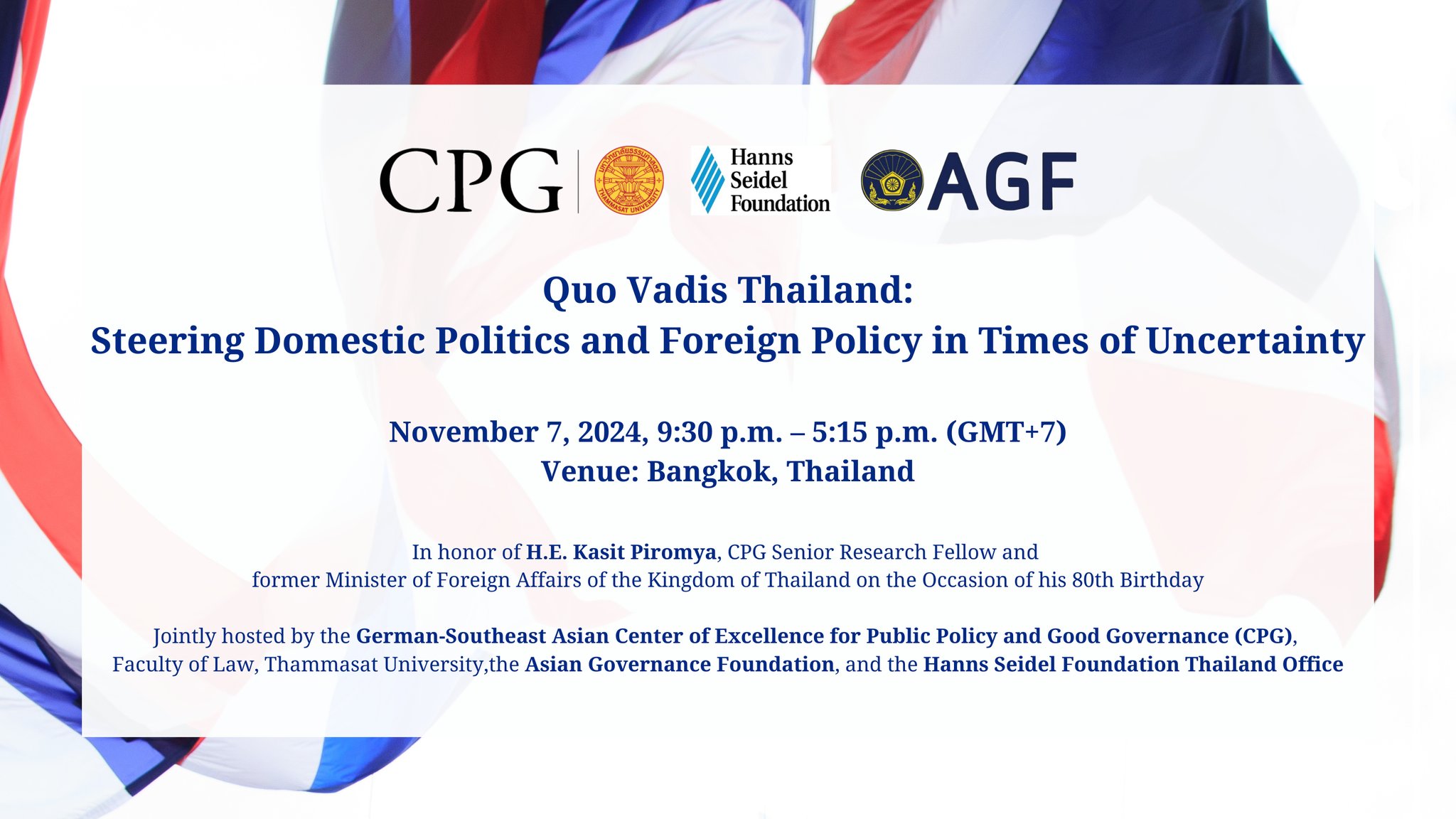On November 7, the HDFF team attended the conference “Quo Vadis Thailand: Steering Domestic Politics and Foreign Policy in Times of Uncertainty”, held in honour of H.E. Kasit Piromya, CPG Senior Research Fellow and former Minister of Foreign Affairs of the Kingdom of Thailand on the Occasion of his 80th Birthday.
Jointly hosted by the German-Southeast Asian Center of Excellence for Public Policy and Good Governance (CPG), Faculty of Law, Thammasat University, the Asian Governance Foundation, and the Hanns Seidel Foundation Thailand Office.
Following is a report from the first panel discussion.
Steering Domestic Politics in Thailand: Issues, Challenges and Potentials
Moderator:
- Pravit Rojanaphruk, Journalist, Khaosod English
Panelists:
- Abhisit Vejjajiva, H.E., former Prime Minister of Thailand
- Panitan Wattanayagorn, Prof. Dr., Member of the Thai Parliament’s Research and Development Committee
- Prinya Thaewanarumitkul, Assist. Prof., Faculty of Law, Thammasat University
1) Major challenges in Thai politics
Abhisit Vejjajiva, former Prime Minister of Thailand, began by honouring Kasit Piromya, who served as Foreign Minister during his tenure, saying Piromya “has always remained true to himself and his ideology.”
Regarding domestic issues, Mr. Abhisit highlighted the lack of accountability in Thai governments, emphasizing that Thailand has struggled to keep up with global challenges and should draw lessons from its past.
Dr. Prinya also raised concerns about institutional structures, noting that so-called independent bodies are not truly independent in practice. He linked this issue to the country’s history of coups, stating that coup-makers chose the senators, who subsequently established these “independent institutions.” He also criticized the frequent constitutional amendments, arguing that they undermine stability.
Dr. Panitan discussed the challenge of conservative populism in the US and how it can affect Thailand. Furthermore, he spoke about the rise of radicalism in the Southern provinces of Thailand. The call for self-determination continues while transnational crime is on the rise. He stressed the need for educational reform in the South.
2) Thai politics are polarized. How can this be reduced?
Mr. Abhisit identified a significant issue in Thai politics: labeling and echo chambers. He argued that this trend, which is counterproductive in a democracy, fosters division rather than encouraging constructive dialogue. He advocated for creating spaces that allow people to engage with each other’s views openly, listening to understand rather than categorizing and deepening divisions.
Dr. Panitan added that the politicization of security-related issues contributes to polarization. He urged for the depoliticization of essential security issues to help reduce tensions.
3) Court and Coup d’etat
Dr. Prinya talked about the fact that the constitutional court has frequently dissolved political parties, and it has been used as a tool for the military and conservatives.
Mr. Abhisit emphasized the importance of understanding why coups happen. He argued that it is because the politicians fail, and stressed the need for a stronger and legitimate political system to prevent future coups.
4) Potentials in Thai Politics
Mr. Abhisit remarked that, while Thai people are known for their kindness and hospitality, this does not always extend to the political arena. This is a mindset he believes should change, as there is great potential for positive development. The media should provide platforms where people can meet face-to-face and share their opinions and interests. Interests must be understood in context.
Dr. Prinya emphasized the need to address the legality of coups in Thailand, noting that while a coup is considered “legal” if it succeeds, the Supreme Court should play a role in rejecting future military takeovers. The last coup in 2014 was legalized through constitutional changes, and he argued that restoring the rule of law is essential. Dr. Prinya expressed hope that the younger generation will drive these reforms and strengthen democratic principles.


Comments are closed